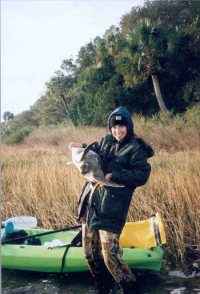
Circumstances beyond her control, conspired to steer Tammy Summers to Belize, where she will be part of an environmental education program on the island off the coast of Central America, which has some 51 parks and reserves
Joining The Peace Corps to Help Save The Environment
Caption: Tammy Summers and turtle off Richardson's Hammock.
by Tim Croft
Tammy Summers can remember the moment the passion was kindled.
A student at Winter Park High School near Orlando, Summers was at the beach near Melbourne one night with her boyfriend when they happened upon a shell-shocking sight.
A hundred or so hatchling sea turtles, struggling blindly in the sand, headed in the wrong direction, away from the water.
"It was my first exposure to sea turtles," Summers recalled of that night. "I was just in awe."
She and her boyfriend gently scooped up the wayward turtles and carefully got them going in the right direction.
Eventually, Summers shed the boyfriend, but the turtles have remained in her blood.
And now, after seven years with the Florida Department of Environmental Protection, overseeing programs at the St. Joseph Bay Aquatic Preserve and involved in so much else, Summers is taking her passion global.
She's joined the Peace Corps.
"I've got the butterflies," Summers said of her upcoming 27-month tour which will begin in May. "It will be hard leaving the people and the (aquatic preserve) program, because I, with the help of a lot of people, really built it up.
"There are just other things out there to do. It's time for something new for me."
It is really, upon reflection, the logical step for a young (age 31) woman with an out-sized laugh and, most who know her would tell you, heart to match.
For since that long-ago night on the beach, sea turtles and protecting their place in this rapidly developing world has been Summers' faithful companion.
"I dreamed of working with sea turtles since high school and college," Summers said. "I just wanted to make a difference somewhere. I have such a passion. I don't (ever) want to lose that passion."
And it turned out that the Peace Corps had grown considerably from its 1960-John F. Kennedy roots.
No longer simply focused on feeding and educating the disenfranchised of the world, the Peace Corps has expanded to include all sorts of outreach, including an environmental program.
"They've really branched out," said Roy Ogles, a DEP biologist who oversees the St. Joseph State Buffer Preserve. "She'll have a lot fun with it."
And upon hearing about the Peace Corps' environmental initiative, Summers was quickly working out where to place her John Henry.
"It sounded intriguing," Summers said, adding that she had hoped to end up in the South Pacific, where an insidious virus is wreaking havoc on the sea turtle population.
"I'd like to stop it before it comes to St. Joseph Bay," Summers continued. "It kills them and I don't want to see that happen to our turtles in St. Joe Bay."
However, circumstances beyond her control, conspired to steer Summers to Belize, where she will be part of an environmental education program on the island off the coast of Central America, which has some 51 parks and reserves.
She'll need to learn Spanish and Creole and she'll be placed with a host family for the first three months.
She'll then move to a village setting where she will help with community education and wildlife monitoring and testing, with an eye toward ending up on a marine reserve.
The Peace Corps provides basic living expenses during her tour - "Enough to allow you to exist like people in the area" - and $6,000 to start over once her tour is over.
"I think this is a good route for me to take at this point," Summers said. "I'd like more of a world vision. I love to travel, to learn new languages, new cultures.
"I think it's important for Americans, particularly right now, to get out in the world to let people know we are not that bad and to help them without forcing our beliefs on them."
That passion, that steely determination, however, can quickly dissolve when the conversation turns to leaving the area and the Apalachicola National Estuarine Research Reserve offices in Eastpoint which has been her work base.
Summers' composure and confidence wavered only when speaking about her co-workers, about departing.
There is much to be proud of, turtle lighting ordinances passed with the lobbying of Summers and others, experiences gained with red tide, fish kills and scallop recruitment that is irreplaceable, but there is much that will be missed.
"The people I'm working with right now, they are family to me," Summers said, fighting tears. "They care so much about what they are doing. They care about the environment and each other. They are such a good group of people, the salt of the earth.
"And St. Joseph Bay has always been my favorite. It's gorgeous ...
"You do what you love. You are not going to be happy if you are making a lot of money but you are not doing what you love. I want to be challenged, tested, learn new things."
